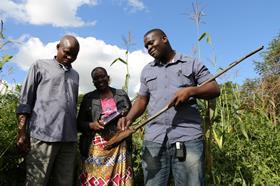
The University of Nottingham is taking aim at hunger from micronutrient deficiencies after receiving £14.8 million from UK Research and Innovation.
The midlands uni will carry out new research into mineral micronutrient deficiencies (MMNDs) with partners in Zimbabwe. MMNDs are a persistent global challenge which affect the growth, development, health and livelihoods of more than 2 billion people worldwide.
MMNDs are especially prevalent in Low Income Countries in sub-Saharan Africa (SSA) and South Asia. Women and children are at greater risk of MMNDs due to unequal access to nutrient-rich foods within the home.
Working alongside research and policy partners in southern Africa, the University of Nottingham’s research team from the School of Biosciences has already built up substantial knowledge on how to alleviate MMNDs, based on ongoing research, and lessons learned from an existing portfolio of long standing collaborations supported through Global Challenge Research Fund and other funding.
These projects are seeking to understand local nutrition, from soil to people via complex food system pathways, described as a 'GeoNutrition' approach, and strengthening research capacity.
This work is part of an ongoing collaboration between the University of Nottingham, the University of Zimbabwe, Lilongwe University of Agriculture & Natural Resources, Malawi, and the British Geological Survey.
The Government of Zimbabwe plans to conduct a national MMND survey in 2020/21 and the research team will inform the design of this full survey, specifically by translating GeoNutrition research findings from Malawi into a pilot survey.
The pilot will include surveys of soil and food crop composition, together with biomarker assessments among people. The pilot survey work will be combined with training and research capacity strengthening activities in Zimbabwe, Malawi, and the UK.
Professor Martin Broadley, one of the Nottingham lead researchers, said: “We are excited to be able to translate our GeoNutrition research into practice, working together with colleagues in Malawi, UK and Zimbabwe.
“Our previous research has developed innovative approaches to spatial micronutrient mapping in soils, crops, and people. Here, we shall enable our colleagues and partners at the University of Zimbabwe to support their government to conduct the first national-scale surveys of MMNDs.
“We shall also be developing our collaborative ethos of GeoNutrition, to empower local, long-term solutions to the global challenge of MMNDs through research capacity strengthening at individual and institutional levels.”
The projects have been funded as part of UKRI’s GCRF Innovation and Commercialisation Programme, developed to fast track promising research findings into real-world solutions.
These new awards are the next step in developing co-produced policy tools and commercial opportunities for products and services that can be used by local communities to help make their lives and environments healthier, safer and more sustainable.



